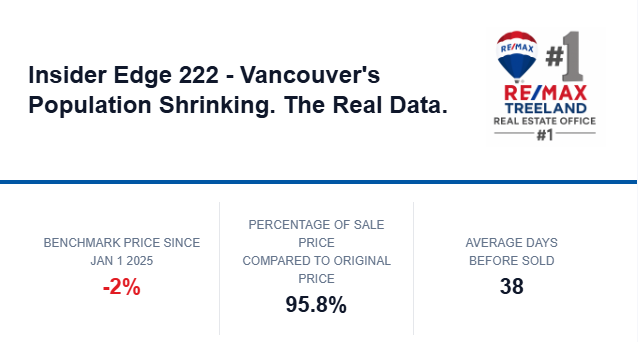Population trends are one of the biggest indicators of real estate values in the long term. If populations are rising, prices will go up, if populations are declining prices will go down. Q1 of 2025 marked the first net population decline in British Columbia since the late 90s. This really is the current headline. The first net out flow of residents can be felt in the rental and real estate markets.
I have a client that had their 2 bedroom Langley condo rented for $2300, and currently can’t find anyone for $2100 per month. A notable and very real drop in prices in the last year.
Home prices aren’t coming out unscathed either, and although also likely affected by the ongoing geopolitical uncertainties the reality is they are down some 5-10% year over year depending on product and location.
But what is the story moving forward? Aside from economic and geopolitical instabilities and strife, our population projections will be the single biggest indicator on the rental and real estate markets in the coming years.
And the long term picture still appears to be population growth. The Q1 2025 population decline was primarily driven by a large outflow of Non permanent Residents (Student Visas and Work Permits) which was fueled by a clamping down on predatory student visa programs taking advantage of pop up colleges. But 2024 saw a net population growth of over 50,000 people to Metro Vancouver
Moving forward net migration policy is aimed at around 55,000 new residents each year to Metro Vancouver. This is a slow down compared to the absurd post covid surge, but slightly above historical norms.
By best baseline projections the Metro Vancouver population is set to grow from 2.71 Million currently, to over 3.3 Million by 2030. This is still very substantial population growth.
The bottom line
I am a little surprised after going through these numbers and the future immigration policy decisions slated for the future. It would appear that although we hit a bit of a lull, Canadas immigration policy as a whole is still full speed ahead.
In the short term 2025-2027 interest rate fluctuations and geopolitical movements are going to see prices and demand having brief stints of life like trying to kick a flat soccer ball down the street. But ultimately nothing special is going to happen, either up or down.
In the medium term 2027-2030 we may see a different picture. Because unless housing completions increase dramatically—well above historic averages—Metro Vancouver will enter 2030 with a larger population, a deeper supply shortage, and upward pressure on prices.











.png)
.png)
.png)
.png)
.png)
.png)
